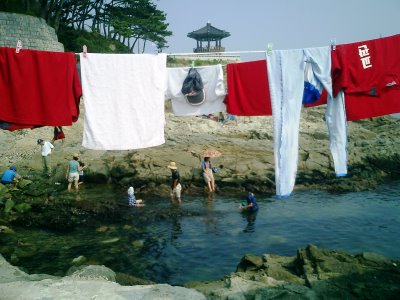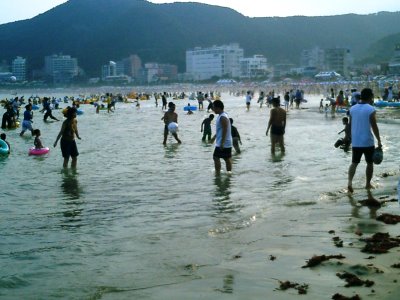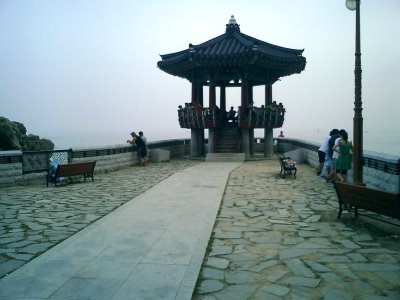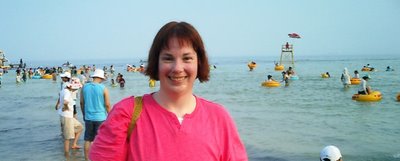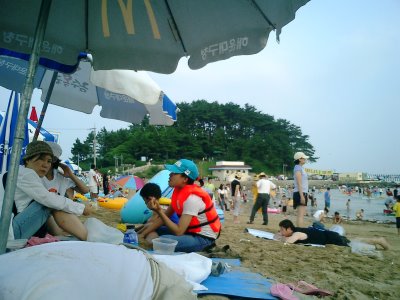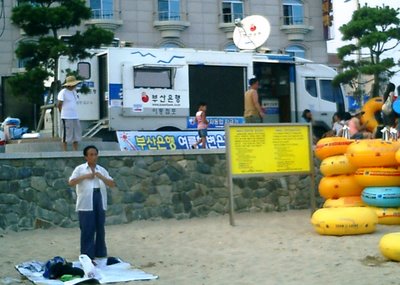Writing this post is not easy for me. I don't like to think about or admit that because I am a foreigner that I am discriminated against here in Korea. But, the fact of the matter is that I am. I had never experienced discrimination before. Of course, as a woman I had experienced sexism but never racism or discrimination. Now I know what it means to be set apart and sometimes unable to spend my hard earned money to purchase goods and services I desire. I have been turned away from nightclubs and told that they don't "admit foreigners". I have had to use a Korean friend's ID number to buy sour cream on-line because I couldn't find it in any store here and my own Alien Registration Card number was not recognized or accepted. It has often reduced me to the same status as that of a dependant child. At first, it was just my inability to read and speak the language that made me so dependent on the help of Koreans. Now, that a number of years have passed and I have worked hard to become - if not fluent at least - competent in Korean I no longer see things with the same naivety that most new-comers do. Nor, do I accept that it is some how my fault for not trying to learn the language and adapt because I have done both to a higher degree than any other foreigner I know here. They say "A little knowledge is a dangerous thing" and in this cause I have to agree. Sometimes I wish I could turn back the clock and not know all that I do about the discrimination of foreigners in Korea. Sometimes the discrimination is subtle and sometimes it is more systemic and wide-spread.
It has taken me a long time and a lot of thought to write this post for my blog. Mainly, for the same reason that I don't post everyday [because of the way life is experienced living as a foreigner in a strange country if I were to post everyday I would seem like I am manic and in serious need of medication. What I mean by that is that when I had a good day I would write how much I love Korea and living here and when I had a bad day I would rant and say I hated Korea and all things Korean]. However, I have never wanted this blog to be a one-sided and negative rant on Korea and Korean society but I did promise myself that I would be honest and try and always present the truth if I could do so in a fair and balanced way. Attaining this balance requires a lot of time and thought and sometimes a cooling down period until I can look and write about an issue that is close to my heart in a more composed way.
Lately, I am bothered by the discrimination I face in Korea. It is not something that is often discussed in a calm clear-headed way at least not from what I have been reading on the internet. The new people who arrive here often don't know they are being discriminated against. Mostly, this is because they can't speak or read Korean and therefore have not tried to integrate themselves fully into Korean society.
I have lived in Korea for over 3 and 1/2 years and have spent a considerable amount of time and money [on books and cd's] to try and learn Korean and my Korean may not sound perfect or pretty but is actually quite functional. I can read Korean and enjoy watching Korean movies with English subtitles. I like to browse the internet and can read and navigate most websites in Korean quite well. As a result, I have tried to join some of the websites that are de rigueur for Koreans such as Cyworld, Nate, and Naver. But as unable to do so because I am a foreigner. How do computers know I am a foreigner? Simple. The system is set up to tell them this.
For almost everything you do in Korea from setting up a cell phone, establishing a bank account or signing up for a Korean e-mail account you need a number. Korean citizens have an ID cards and foreigners have Alien Registration Cards [ARC] both systems assign the numbers for life. Now comes the sticky part, there is a separate system of numbers for foreigners. For example all women in Korea born before 2000 have a number that starts with a 2 and all men born before 2000 have a number that starts with a 1. [After 2000 the male numbers begin with a 3 and female numbers begin with a 4]. The problem is ARC numbers don't begin with the same numbers, in fact, my ARC number begins with a 6 and therefore instantly identifies me as a foreigner and therefore not eligible for service. Computers don't recognize any numbers other than the ones that begin with a 1 or 2 [and I guess now 3 and 4]. When I use my number beginning with a 6 on-line all I get is an error message.
This requirement for numbers and the assigning to foreigners of numbers that are not recognized even by major corporations is a huge problem. It sets up a system by which foreigners can never really participate in all aspects of life in Korea. It sets us apart and segregates us.
I have been thinking about this situation and the frustrations and hard feelings it causes by making foreigners feel like second-class citizens in a country where they are legally living and working and paying taxes sometimes for multiple years. I've even talked to Korean friends and colleagues about this situation. None of the people I talked to were even aware of the situation and they were surprised to learn that a "white woman for {Canada} a first world country"[their description of me not my own] was not allowed to even internet shop in Korea. The only discrimination they were aware of was that directed toward women from third-world countries in Southeast Asia who marry rural Korean men. [Korean men living in rural areas cannot find Korean women willing to marry them and live away from the bright lights of the big cities but that is an issue for another post.]
My circle of Korean friends and acquaintances would be even more surprised to learn that
"Korea earned a reputation as one of the more hostile countries toward foreigners". I read this in an article in the Korean Herald just this week.
Here's the link to the article to which I am referring.
Korean Herald Article
However, the Korean Herald has a nasty habit of after a couple of weeks making their webpages accessible to only "Premium Service Members" and this requires paying a fee {probably with a Korean Credit card for which I as a foreigner am not eligible} [if you don't believe me check and see the link I added to their article on "Heavy Rains" in my post entitled "Typhpoon Ewinar and Rain, rain and more rain". This was the first time I linked directly to their site and it worked well for several weeks, now however, it isn't accessible even to me. Since I am sure this isn't an isolated incident I have taken the precaution of cutting and pasting the entire article into this blog. Despite, that I am leaving the link so that if anyone wants they can check my sources and the link should work for the next couple of weeks anyway.
***
Seoul sketches fuller life for foreigners
-->
Foreign community says much more must be done to help them feel at home
This article is the last of a 10-part series dealing with multiculturalism in Korea. - Ed.
In an eagerly awaited move, the Korean government recently announced sweeping changes to its policies toward foreigners in an apparent effort to tackle the rampant discrimination against noncitizens.
In May this year during the first policymaking meeting on the treatment of foreigners, officials from 17 government organs gathered alongside the prime minister to discuss feasible measures for upgrading the lifestyles and overall environment of the foreign community.
The focus of the conference was mostly on ethnic Koreans holding foreign citizenship and women who crossed borders to marry Korean men.
Outlining six key policy goals, the government stated that it would build on these initiatives to continue molding policy safety nets for people of foreign nationalities.
The six goals, although only an initial step, are compelling, observers say, since so far, Korea has been classified as not quite up to par when it comes to governing foreigners.
In fact, contrary to its vision of blossoming into Northeast Asia's throbbing financial and logistics hub catering to global businesses and residents, Korea earned a reputation as one of the more hostile countries toward foreigners.[This is the part I quoted earlier].
Further fueling the bad press, the Roh Moo-hyun administration cracked down on multinational firms by ratcheting up tax guidelines. Fears arose in the foreign business community here that the red tape would soon catch up with them.
"Many foreign firms complained that there are no clear guidelines on how to interpret regulations of the Korean government," said Chung Tong-soo, the head of Invest Korea, an organization committed to foreign investment under the state-run Korea Trade-Investment Promotion Agency.
In May this year, the government raised eyebrows in the foreign business community by ruling that Lone Star Funds, a U.S.-based equity fund, owes Seoul City billions of won in taxes. Lone Star is currently trying to sell Korea Exchange Bank, [the only bank that offers a credit card marketed towards foreigners living and working in Korea - my comment] which was bought in the aftermath of the financial crisis, but complications arose after the Finance Ministry was found to have played a hand in selling the bank at a discounted price.
"The time is ripe for Korea to step up an exchange with foreign cultures. That is the trend of the future and the world, and one that is aligned with our national vision," said President Roh Moo-hyun during the May foreign policy meeting.
The significance of the role that foreigners play in local society can no longer be ignored, he stressed, since Korea would inevitably have more multinational companies.
As of 2005, the official number of foreigners residing here hit 747,467. That is approximately 1.55 percent of the entire South Korean population, according to figures from the Justice Ministry, the main government organization in charge of migration and foreigner-related affairs. Given the steady rate of increase, the figure is expected to reach 2.54 percent by 2010.
Another staggering reflection of the growing foreign community is the number of foreigners who entered and left the country; that more than doubled between 1995 and 2005, the ministry data showed.
So even from a nationally strategic standpoint, it has become impossible for Korea to put foreigner-related issues on the back burner, experts say.
Key policy goals
Under the broader aim of enhancing personal security for foreigners in order to improve social integration, the government laid out six policy goals: ease discrimination against ethnic Koreans holding foreign passports; beef up protection for foreign women married to Koreans and their offspring; increase support and protection for refugees; streamline legal guidelines for foreign workers; step up protection of human rights for illegal foreigners; and overall, create a healthy environment in which foreigners and Koreans can cohabit.
In efforts to distance itself from its previously domineering image, the administration said these goals would be rooted in the basic ideas of "mutual respect and understanding."
The detailed measures in the policy goals include the deployment of visitor working visas for ethnic Koreans, who account for a significant number of the foreigners streaming in.
Last year, China, where large numbers of ethic Koreans reside, was the main source of foreigners coming to Korea.
The government is planning to allow the parents of Chinese students with Korean roots who attended university here for over six months to work for Korean companies.
Despite the quota the government will impose to control the volume of students, this means easier access to Korean schools for these children and could possibly help the current shortfall in university students.
"I am most confident that the introduction of this system would significantly change the dynamics of the Chinese-Korean society by urging students to study more and in particular, learn the Korean language," said Seo Kyung-suk, a pastor at a Seoul-based church for Chinese immigrants.
Seo added that the plans should be applied to all foreigners. "Parents must be allowed to join these students," he said.
Foreigners - mostly women - who crossed borders to marry Koreans will receive a boost in their status.
They will be provided with minimum living expenses and medical care, while more education opportunities are to be offered to their children.
There has been a dramatic increase in the number of Korean men choosing foreigners as spouses
These women are often maltreated by their Korean families, a practice the government has vowed to crack down on.
Exclusive ethnic networks will also be created to enhance friendships between the women to help them feel more at home, officials say.
Illegal residents will receive more lenient penalties so that despite their status, their children may become eligible for proper education here.
The need to create a better environment for foreign workers was also addressed. A key clause the government suggested was to allow skilled technicians to stay for up to five years at a time, up from the current three years.
Looking forward
In this year's local elections, foreigners with Korean residency were allowed for the first time to cast ballots.
Although the votes were limited to those who met strict residence conditions, the move marked a compelling change in Korea's foreigner-related policies.
"For me, it was a watershed moment. I have waited so long for this day. I have endlessly petitioned on this issue because I felt it's unfair that I am regarded as a foreigner even though I pay my taxes and look and sound like everyone else," said Yang Jong-seung, a 56-year-old Taiwanese businessman who was born and raised here.
Yang was joined by over 6,000 other voters who were ecstatic over their recognition as full-fledged citizens.
Looking into the near future, Koreans will have to embrace an even larger foreign community as the country opens up to more investment from abroad and most importantly, foreigners who look forward to a savvy lifestyle in Asia's third-largest economy. Competition with other Asian neighbors is likely as more countries eye finance and service industries to bolster their growth.
The volume of immigrants, regardless of whether they are wanted or not, will also inevitably climb higher if the figures so far are anything to go by.
The time appears to be more than ripe for Korea to shape new policies to help form a society where both Koreans and their foreign counterparts live and work as compatible partners.
(jemmie@heraldm.com)
By Kim Ji-hyun
2006.08.15***Even after 3 and 1/2 years here I have not been able to get a cell phone account and have to use PPS [pre-paid service] or as Canadians call it "pay as you go". This is very expensive over 50 cents a minute Canadian [double the rate in Canada]. I have a Canadian credit card, a Korean bank account, a job, an Alien Registration Card and even a working Visa issued by the government of Korea and I still can't get a cell phone account. In fact, I know only two foreigners who have their own cell phone accounts. One is a friend who I will call S. who has a management position at a large multinational company here in Korea and the other is a Cat, a fellow blogger, in Seoul. Cat wrote about her struggles to get a cell phone account in Korea.
Here's the link to that.
Cat's Struggle to get a cell phone accountThe Galbijim has a great article on getting a cell phone in Korea. Even they say that it is hard for foreigners to establish an account in their own names. This is a quote from their site. "
Sign up for a plan under your own name. This is the most difficult option. You must have your Alien Registration Card (ARC), so you will be unable to sign up for at least a couple weeks after your arrival in Korea. [I had to have my ARC card to re-establish service on my own Pre-paid cell phone so had my Recruiter do this for me until I got my ARC card. I laughed and told friends a Russian Mobster could get a throw-away phone easier in New York City than I could get a cell phone in Korea.]Even once you have the ARC, not all companies make it easy for foreigners. SK requires an extra 200,000 won deposit and KTF requires a Korean credit card for the monthly balance to be automatically deducted. If you want to get a monthly phone plan from SK or KTF, then you need your ARC, passport and a deposit of 200-300,000won, in addition to the cost of the phone. If you are lucky enough to have an employer or Korean friend willing to do this for you, they can sign the plan contract in their name to avoid the deposit. There's usually a hookup fee of around 50,000won. There are many usage plans to choose from, so choose wisely.
LG does not require the extra deposit, just a 30,000원 setup fee that can be spread out over a few months' payments. Your monthly bill can be deducted from your bank account, rather than a Korean credit card, so make sure to bring your bank book with you.
Note: if you have a credit card, you can usually have the deposit waived."Galbijim Info on Getting a cell phone in KoreaI have been reading a lot on the internet about this issue and I have found some interesting discussions on Pusanweb and Dave's ESL Cafe. The Pusanweb link is from an open forum on Korean Related Issues. The people there discuss the same things I have mentioned that even the internet sites that let you join won't accept a foreign credit card so we can't even buy the services they offer. One member mentions the fact that a few years ago the discrimination against foreigners on the internet was a huge issue and made the press and that the government then told Korean corporations that foreigners ARC
"... numbers CAN be accepted. They did not say MUST be accepted. So, it is up to each individual company to decide if they will accept the numbers or not. And for most of them, we are not worth the trouble of hiring a couple of temp coders to write the variables into their databases that would accept numbers in the 'wegugin' ranges."
The posts go on and on with people making fun of Korean's marketing slogan "The Hub of Asia". As per most of the forums related to Korea posted by foreigners things get pretty heated and sometimes down right hostile. I don't often read and post on these sites because of the negativity and hostility that can result but in this case I do understand. It is frustrating when [often well-intentioned] Koreans post on these sites and try to either offer excuses for our exclusion or try to tell us we can use the services when we have tried multiple times and have failed. Anyway, you can read all about it for yourself at this link.
pusanweb forum on Korean Internet SitesDave's ESL Cafe the mecca of ESL teachers has multiple discussions about Foreigner Discrimination and links to more sites than I can count. Here's the link.
Dave's ESL Cafe Discussion on Koreans Attitudes Towards ForeignersDave's ESL Discussion about Foreigners Exclusion from Korean WebsitesWhen I used to teach adult students sometimes they used to send me e-mails to my hotmail account from hanmail [the Korean equivalent to hotmail] and when I would reply to them hanmail would not let my message through. It said that my message was "spam". However, I am unable to set up a Korean e-mail account. My students used to get angry at me for not replying to them. The really found it hard to believe that their e-mail systems would not recognize my e-mail address since they had sent me a message first and that I absolutely unable to find any international e-mail system [yahoo, gmail, hotmail] that Korean internet serves would let be delivered. Now I know that if a Korean friend or student asks for my e-mail address I must tell them to add me to their hanmail address book or e-mail me from yahoo or some other more international e-mail site or they will NEVER receive my reply. What a pain and not exactly user friendly. Other foreigners agree here's yet another link to information on that.
Problems between English and Korean E-mailThere is now a petition to on-line at Dave's ESL Cafe to let foreigners numbers be accepted on the internet in Korea. Here's the link to that.
Petition to let foreigners join Korean websitesWell that's my rant on Korean and some of the discrimination I face on a daily basis here. I hope it didn't turn out to be as nasty as some of the threads on the discussion boards I have just been reading and to which I have been linking. This sometimes systemic discrimination is an untenable aspect of life here in Korea and it makes foreigners feel even more isolated and alienated than we already feel living in a foreign country far away from our loved ones. I guess maybe when you discuss such emotionally charged issues it does bring out the negative side of people. I can only hope that with petitions and the education of average Koreans to the plight of foreigners here in Korea that change can begin.
